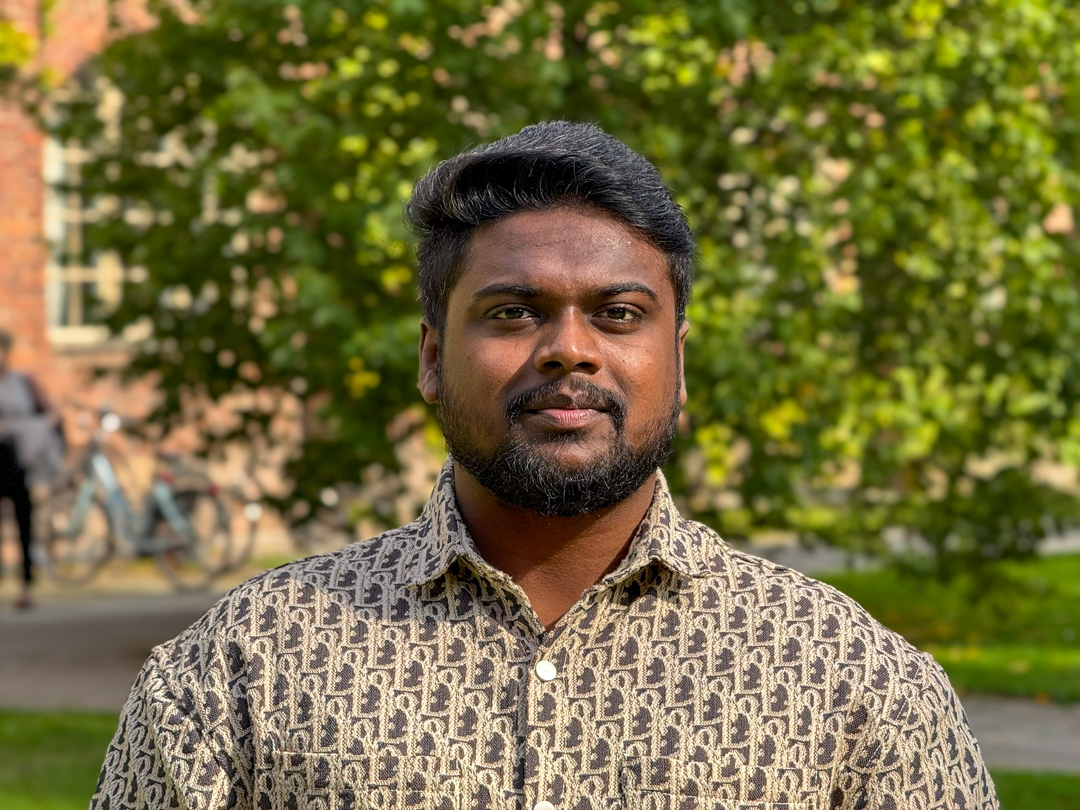Lingeshwaran
Lingesh is from India, and currently pursuing the Master’s in Production Engineering and Management at KTH. He completed his Bachelor’s in Automobile Engineering at the Madras Institute of Technology. When he’s not buried in textbooks, he enjoys experimenting with new curry recipes in his kitchen, exploring different spices and cooking techniques. He’s outgoing and approachable, greeting everyone with a warm smile and genuine curiosity that makes befriending and chatting with him effortless.

Why did you choose this master’s programme at KTH?
My bachelor’s in automobile engineering sparked my interest in how an entire factory works, not just the engines. I wanted a master’s that follows a product from its first 3-D model to the moment it rolls out of the loading bay, covering planning, automation, logistics and sustainable manufacturing along the way. The Industrial IT-systems track drew me in because it digs into the data, PLM and Industry 4.0 tech that keep today’s factory running smoothly. And with Volvo and Scania practically down the road, the guest lectures and thesis projects come straight from industries, which is perfect preparation for a career in automotive production.
What are the best aspects of your programme?
What I value most is how practical every course feels. Instead of cramming for finals, we spend each block tackling real projects in small, international teams. One week, we’re in the lab, and the next, we’re at a partner factory to see whether our ideas hold up at an industrial scale. The labs stay open late, so there’s always time to tweak a model or rerun an experiment after class. This rhythm turns study into real, everyday engineering work.
What are some of your favourite courses so far?
My standout courses are Production Engineering – Planning and Control (MG2029) and Product Lifecycle Management (MG2135). MG2029 demystified how forecasts become a master schedule and, finally, lean shop-floor tasks, with value-stream mapping sessions that reveal where minutes are money. MG2135 took a broader view, showing how every document, BOM and service note is threaded through a PLM system, building an information model and working directly with its data proved that clean information matters as much as clean machining. Together, they tie daily production choices to a product’s entire life cycle.
How do studies at KTH differ from your previous studies?
Back home, most learning happened in lecture halls where the professor set the pace, and a big final exam carried the most weight. At KTH, the rhythm is almost the opposite. Courses are run as guided projects, and the teacher shifts into a coaching role while students steer the work. Instead of memorising derivations, we read research papers, debate solutions in class, and then test our ideas in small groups. Assessment feels like a series of checkpoints with short reports, peer reviews and presentations. So, feedback comes early and often. The atmosphere is informal too; it’s completely normal to call professors by their first name and drop by for advice. Finally, industry voices are woven into the syllabus through guest workshops and case assignments, which keep every topic anchored to real production challenges. The result is a learning environment that prizes initiative, collaboration and critical thinking as much as technical depth.
What would you like to say to students thinking of choosing KTH for master’s studies?
If you are thinking about KTH, bring an open mind and a warm jacket because you will need both. The university lets you test ideas in ways a textbook never could, yet the real magic lies in the community you join. From the first week, you will find yourself swapping ideas over lab projects and fika breaks with classmates from around the globe, and those conversations often teach as much as the lectures. Stockholm itself is a living classroom with tech meet-ups after class, frozen lakes for winter skating, and light-filled parks for a spring reset. Professors encourage you to speak up, question assumptions, and chart your course. The guidance is there, but the steering wheel is yours. If you are eager to build, explore, and collaborate and can embrace Sweden’s daylight swings, KTH will reward you with knowledge, friendships, and a global network long after graduation.
